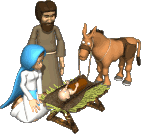

Other dates of celebration

Although Christmas may be celebrated on December 25 -31 in historically Catholic and Protestant nations, in eastern Europe it is often celebrated on January 7. This is because the Orthodox church continues to use the Julian calendar for determining feast days.
The Orthodox churches fast during the forty days before Christmas. Christmas is dubbed the "Feast of the Nativity of our Lord, God, and Saviour Jesus Christ." Armenian Christians celebrate Christmas on January 6.
Dates for the secular aspects of the Christmas celebration also vary. In the United Kingdom, the Christmas season traditionally runs for twelve days beginning on Christmas Day. These twelve days of Christmas, a period of feasting and merrymaking, end on Twelfth Night, the eve of the Feast of the Epiphany. In medieval times, Swedish law provided for a Christmas peace (julefrid) of twenty days during which fines for robbery and manslaughter were doubled. On Knut's Day, the twentieth day after Christmas (January 13), Swedish children celebrate and throw out the family Christmas tree (julgransplundring).
The Christmas festive period has grown longer in some countries. In the U.S., the pre-Christmas shopping season begins on the day after Thanksgiving. In the Philippines, radio stations usually start playing Christmas music during what is called the "-ber months" (September, October, etc.).
Countries that celebrate Christmas on December 25 recognize the previous day as Christmas Eve and have various names for the day after Christmas. In the Netherlands, Germany, Scandinavia, Lithuania and Poland, Christmas Day and the following day are called First and Second Christmas Day. In many European and Commonwealth countries, the first non-Sunday after Christmas is referred to as Boxing Day. In Finland, Ireland, Italy, Romania, Austria, and Catalonia (Spain), the day is known as St. Stephen's Day. In Quebec, the December 26 holiday is referred to as Lendemain de NoŽl ("the day after Christmas").
Regional customs and celebrations
Christmas worldwide
Many Christmas practices originate in Germanic countries, including the Christmas tree, the Christmas ham, the Yule log, holly, mistletoe, and the giving of presents. The prominence of Christmas in Germanic nations may be a form of carryover from the pagan midwinter holiday of Yule.
NEXT: Christmas Around the World

|
|
|
|
|
|
|
|

|
|
|